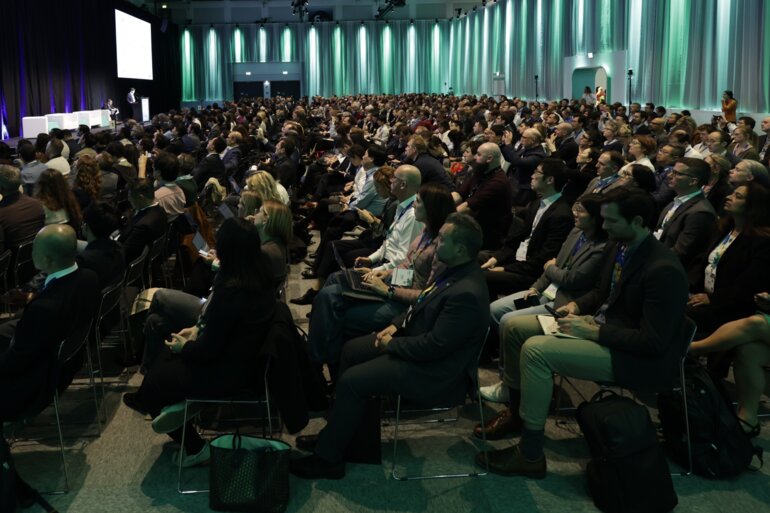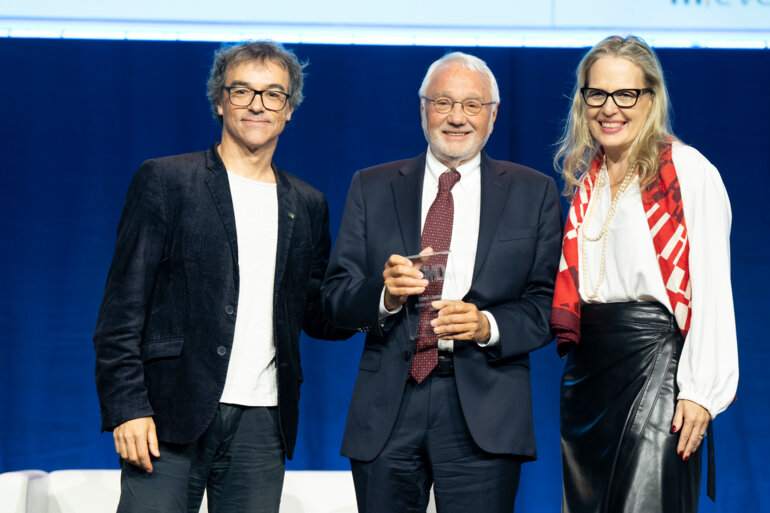The bispecific EGFR/MET-directed monoclonal antibody looks set to become the standard of care in this setting, but toxicity has to be managed carefully
Primary results from the phase III PAPILLON trial presented in a Presidential Symposium at the ESMO Congress 2023 (Madrid, 20–24 October) reported a median progression-free survival (PFS) of 11.4 months with amivantamab plus chemotherapy versus 6.7 months with chemotherapy (hazard ratio [HR] 0.395; 95% confidence interval [CI] 0.30–0.53; p<0.0001) in patients with untreated EGFR exon 20 insertion-mutated advanced non-small cell lung cancer (NSCLC) (LBA5). Most of the 308 patients were female, over half were Asian and 23% had a history of brain metastases. Median follow-up was 14.9 months.
The 18-month PFS rates with amivantamab plus chemotherapy and chemotherapy alone were 31% and 3%, respectively, with consistent PFS benefits of amivantamab plus chemotherapy seen across predefined subgroups, such as age (<65 years and ≥65 years), race (Asian and non-Asian) and smoking history. The combination therapy was also associated with improvements over chemotherapy in objective response rate (73% versus 47%, respectively; odds ratio 3.0; 95% CI 1.8–4.8; p<0.0001) and in median PFS after first subsequent therapy (not estimable versus 17.2 months, respectively; HR 0.493; 95% CI 0.32–0.76; p=0.001).
“The results from the PAPILLON trial provide the phase III data required to confirm the value of amivantamab for these patients, who should hopefully soon have access to a treatment that will improve their outcomes,” says Prof. Benjamin Besse from the Institut Gustave Roussy, Villejuif, France. “The 60% reduction in risk for the primary endpoint is quite remarkable and was achieved against a control arm that performed to the level expected in this type of population.”
In the study, interim overall survival (OS) analysis at 33% maturity showed a favourable trend for amivantamab plus chemotherapy over chemotherapy (HR 0.675; 95% CI 0.42–1.09; p=0.106), even though 66% of patients progressing in the chemotherapy arm went on to receive second-line amivantamab. “Although we need much more mature OS data, it is encouraging to see a trend in favour of upfront amivantamab, despite the rate of crossover on progression of patients from the control arm to amivantamab. Indeed, the survival data for this crossover cohort could provide some useful insights into amivantamab efficacy,” explains Besse.
The data from PAPILLON coincide with the announcement that another EGRF inhibitor, mobocertinib, failed to show first-line efficacy over chemotherapy in the EXCLAIM-2 confirmatory trial, leading to its voluntary removal from the second-line setting. “This leaves the field open for amivantamab to become the standard of care first line, although it is already available in some countries as a second-line agent,” says Besse.
In the PAPILLON trial, the most common treatment-emergent adverse events (AEs) with amivantamab plus chemotherapy were neutropenia, paronychia, rash, anaemia, infusion-related reactions and hypoalbuminaemia, with 7% of patients discontinuing amivantamab due to treatment-related AEs. Besse observes that amivantamab’s efficacy comes at a price: “The side-effects characteristic of EGFR inhibitors can be very unpleasant for patients. Amivantamab’s half-life of 11 days (J Clin Oncol. 2021;39:3391–3402) means that when treatment is discontinued or interrupted as part of AE management, it takes time for the effects to resolve. Physicians should therefore manage side effects aggressively as soon as they appear,” he says.
Abstract discussed:
Girard N, et al. Amivantamab plus chemotherapy vs chemotherapy as first-line treatment in EGFR exon 20 insertion-mutated advanced non-small cell lung cancer (NSCLC): primary results from PAPILLON, a randomized phase 3 global study. ESMO Congress 2023, LBA5
Presidential Symposium 1, 21.10.2023, h. 16:30 – 18:15, Madrid Auditorium – Hall 6







